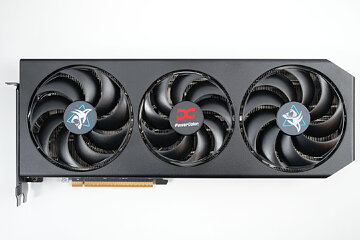 31
31
PowerColor Radeon RX 9070 Hellhound Review
Circuit Board Analysis »Packaging
The Card
The PowerColor RX 9070 Series Hellhound design matches the style of the company's Radeon RX 7000 Series Hellhound cards. Black is the primary color, with gray and white highlights sprinkled on the card. The metal backplate that has a cutout for air to flow through.
Dimensions of the card are 33.0 x 13.0 cm, and it weighs 1076 g.
Installation requires two slots in your system. We measured the card's width to be 40 mm.
Display connectivity includes three standard DisplayPort 2.1a and a HDMI 2.1b.
With RDNA 4, AMD put effort to improve its standing with game streamers and creative professionals. It's done this by giving Navi 48 a dual VCN solution, so the GPU has two concurrent hardware accelerators for encoding and decoding. Perhaps the biggest changes at the silicon level is that AMD improved the encoding quality of its hardware H.264 and HEVC codecs. This was a niche complaint streamers had with AMD GPUs, and would avoid the brand altogether. The company also updated its AV1 hardware acceleration with support for B-frames, which are frames that lack image information, but math data that let the decoder reconstruct image data by comparing with the image data from adjacent I-frames containing it. This technique vastly improves streaming bitrates since half the frames lack image data.
PowerColor has installed a fixed blue lighting element behind the eye of the hound print on the back of the card, on the eye—very hard to notice. A second zone of the same color is located near the back end of the card.
The card uses two 8-pin PCIe power connectors, which are specified for up to 300 W, plus 75 W from the slot, the actual power limit of the card is much lower of course.
This BIOS switch lets you toggle between the default performance BIOS and a second "quiet" BIOS. Also note here, the LED switch, which lets you turn off the lighting easily, without any software installation needed.
Teardown
The PowerColor cooling solution uses four heatpipes. The heatsink provides cooling not only for the GPU, but also for the memory chips and VRM circuitry.
The backplate protects the PCB against damage during handling and installation.
Apr 9th, 2025 18:58 EDT
change timezone
Latest GPU Drivers
New Forum Posts
- What is this temp sensor referring to? (0)
- Cache Ratio stuck at 600hz lower than Turbo Cores with Ring Down Bin on (3)
- Does anybody know a way to make a scratch on the glass case panel less noticeable or remove it? (21)
- Msi Vector 16HX Undervolt (10)
- Technical Issues - TPU Main Site & Forum (2025) (87)
- Asking before I mess up (1)
- What's your latest tech purchase? (23503)
- TPU's Nostalgic Hardware Club (20209)
- 9070XT or 7900XT or 7900XTX (178)
- ThrottleStop Cache Ratio Fluctuating/Changing Automatically (7)
Popular Reviews
- The Last Of Us Part 2 Performance Benchmark Review - 30 GPUs Compared
- MCHOSE L7 Pro Review
- UPERFECT UStation Delta Max Review - Two Screens In One
- ASRock Z890 Taichi OCF Review
- Sapphire Radeon RX 9070 XT Pulse Review
- PowerColor Radeon RX 9070 Hellhound Review
- Upcoming Hardware Launches 2025 (Updated Apr 2025)
- Sapphire Radeon RX 9070 XT Nitro+ Review - Beating NVIDIA
- ASUS Prime X870-P Wi-Fi Review
- Acer Predator GM9000 2 TB Review
Controversial News Posts
- NVIDIA GeForce RTX 5060 Ti 16 GB SKU Likely Launching at $499, According to Supply Chain Leak (172)
- MSI Doesn't Plan Radeon RX 9000 Series GPUs, Skips AMD RDNA 4 Generation Entirely (146)
- Microsoft Introduces Copilot for Gaming (124)
- AMD Radeon RX 9070 XT Reportedly Outperforms RTX 5080 Through Undervolting (119)
- NVIDIA Reportedly Prepares GeForce RTX 5060 and RTX 5060 Ti Unveil Tomorrow (115)
- Over 200,000 Sold Radeon RX 9070 and RX 9070 XT GPUs? AMD Says No Number was Given (100)
- Nintendo Confirms That Switch 2 Joy-Cons Will Not Utilize Hall Effect Stick Technology (99)
- Nintendo Switch 2 Launches June 5 at $449.99 with New Hardware and Games (98)




















